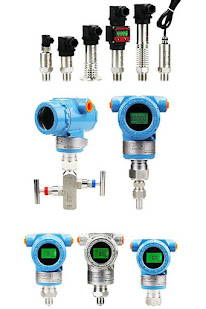Pressure sensors are devices that measure the pressure of gases or liquids. They are widely used across various industries and applications. Here's a classification and some common uses of pressure sensors:
Types of Pressure Sensors:
1. Absolute Pressure Sensors:
- Measure pressure relative to a perfect vacuum (0 Pa).
- Used in applications where the pressure needs to be measured against a zero pressure reference (vacuum), such as in weather forecasting or space applications.
2. Gauge Pressure Sensors:
- Measure pressure relative to the surrounding atmospheric pressure.
- Commonly used in tire pressure monitoring systems, automotive applications, and HVAC systems.
3. Differential Pressure Sensors:
- Measure the difference in pressure between two points.
- Widely used in filtration systems, liquid level measurements, and airflow measurement
4. Sealed Pressure Sensors:
- Measure pressure relative to a fixed pressure that is sealed within the sensor.
- Used in systems where atmospheric pressure changes do not need to be considered, like in sealed enclosures or some industrial applications.
5. Intelligent or Smart Pressure Sensors:
- Equipped with microprocessors to provide more accurate, reliable, and sometimes wireless data.
- Used in modern industrial systems, smart homes, and IoT devices.
Common Uses of Pressure Sensors:
1. Automotive Industry:
- Monitoring tire pressure (TPMS).
- Engine control systems, oil pressure monitoring, and fuel pressure sensors.
2. Industrial Applications:
- Process control in manufacturing and automation.
- Monitoring fluid systems in pipelines, pumps, and compressors.
3. Medical Applications
- Blood pressure monitoring.
- Respirators and ventilators (measuring air or gas pressure).
- Infusion pumps to monitor fluid pressure.
4. HVAC Systems:
- Monitoring air pressure in ducts.
- Measuring the pressure difference across filters and ventilation systems.
5. Aerospace and Aviation:
- Measuring altitude via atmospheric pressure.
- Monitoring cabin pressure and engine performance.
6. Oil & Gas Industry:
- Wellhead pressure monitoring.
- Flowline pressure and control system monitoring.
7. Consumer Electronics:
- Smart devices for weather stations.
- Altimeters in watches and smartphones.

No comments:
Post a Comment